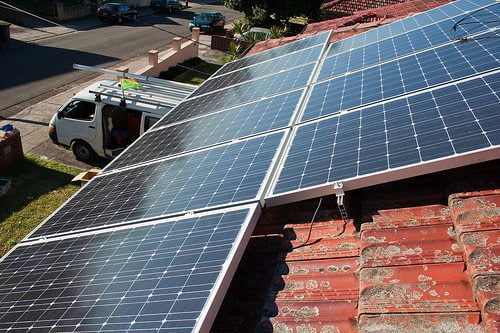

Economy
Renewables to compete for £300m subsidies but solar industry penalised
The government has unveiled plans to increase support for renewable energy from £95 million to £300 million but the industry fears the system would harm solar development and provide little value for money.
Blue & Green Tomorrow is currently running a crowdfunder to ensure its survival. Please pledge.
The renewable energy sector will be competing for £300 million subsidies this autumn under the new Contracts for Difference (CfD) scheme. The government argues that it would provide investors with more certainty and lower energy bills.
Energy secretary Ed Davey said, “We are transforming the UK’s energy sector, dealing with a legacy of underinvestment to build a new generation of clean, secure power supplies that reduce our reliance on volatile foreign markets.
“Average annual investment in renewables has doubled since 2010 – with a record breaking £8 billion worth in 2013. By making projects compete for support, we’re making sure that consumers get the best possible deal as well as a secure and clean power sector.”
The CfD makes difference between established and less established technologies, competing for £65 million and £235 million respectively. This is because the government feels that the former are already more competitive.
But the Renewable Energy Association’s chief executive Dr Nina Skorupska argued that the allocation process was too complicated and risky for small renewable firms and that cheaper and safer technologies – for instance onshore wind and solar – have been penalised in the short term. Renewable energy supplier Good Energy shares the same concern, with CEO Juliet Davenport saying solar needs ‘stable support’.
The announcement was met with particular criticism from the solar industry.
Paul Barwell, chief executive of the Solar Trade Association, said, “Why is the UK Government putting this industry’s incredible achievements on solar power at risk? To curtail its growth now is just perverse and unjustified on budgetary grounds – solar has only consumed around 1% of the Renewables Obligation budget.
“British Solar needs a stable policy framework to retain its growth to drive down costs so consumers see a direct reduction in their future electricity bills.”
Seb Berry head of public affairs at Solarcentury added, “Earlier this week, on the Conservative Party conference fringe, Ministers were busy talking up the contribution from solar and promising “long-term certainty” for investors in all renewables.
“Today’s announcements however, do little to undo the disruption and uncertainty of the last five months, providing at best a very marginal boost to roof-top solar to 2020 while confirming a premature end to the solar Renewables Obligation for large-scale projects.”
Environmental group Friends of the Earth also argued that the CfD scheme would harm large-scale solar. The group’s renewable energy campaigner Alasdair Cameron said, “Solar could be cheaper than fossil fuels in just a few years, but it needs a little more help from Government to get it there. Failure to invest now will mean a huge missed opportunity for the UK economy”.
Photo: Edmund Tse via Flickr
Further reading:
Ambitious energy efficiency targets are key to combating climate change
IEA: solar could be largest electricity source by 2050
Solar energy investment ‘coming of age’ and attracting institutional investors
2013 record year for solar PV but sector still ‘policy-driven’
DECC plans to scrap solar farm subsidy will ‘undermine investment’


 Features11 months ago
Features11 months agoEco-Friendly Cryptocurrencies: Sustainable Investment Choices

 Energy11 months ago
Energy11 months agoThe Growing Role of Solar Panels in Ireland’s Energy Future

 Energy10 months ago
Energy10 months agoGrowth of Solar Power in Dublin: A Sustainable Revolution

 Energy10 months ago
Energy10 months agoRenewable Energy Adoption Can Combat Climate Change






















